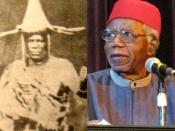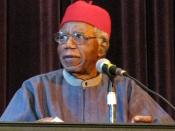Chinua Achebe's first novel Things Fall Apart is a story about an Igbo village in the late 1800's, and is one of its important men, Okonkwo. The story analyzes the destruction of African culture when the white man appeared. Achebe writes in a style that is interpretive instead of objective, and reflects the sociocultural organization existing in Africa during that era. Achebe highlights the roles of women in pre-colonial Africa. The female characters in the novel are major figures whose lives are not just affected by the desires of their husbands or fathers; the women reciprocally affect the husband and fathers lives. Igbo society emphasis is put on sex-roles, stereotyping, gender discrimination and the importance of masculinity and violence, which result in the abuse of the female's character.
In Igbo society patriarchy rules in every aspect of existence, meaning women are excluded and men are superior. Women were seen as men's property and wives came in multiple numbers.
Women were bought and sold into marriage and once she became a man's property she became a little more than an object. The first wife of a man was paid more respect than others illustrated by the palm wine ceremony. Anasi, Nwakibie's [a big man in Umofia] first wife had not arrived and "the others could not drink before her" (14).
Women were among one of the highest distinctions for a young man along with yam barns and social titles. Okoye, a friend of Okonkwo's father, qualified for these high distinctions because "he had a large barn full of yams and he had three wives. And now he was going to take the Idemili title, the third highest in the land." (5).
The yam symbolizes richness and is a sign of a great man. The women of Igbo provided the workforce...


